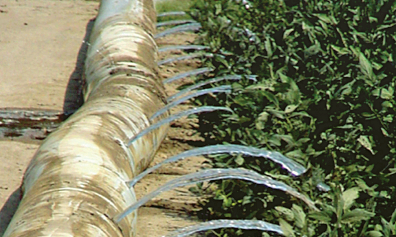Water Conservation in the Delta
Measurements + Modeling = Smart Management
In Eastern Arkansas, where 80 percent of land use is for agriculture, groundwater conservation is critical. Michele Reba, a research hydrologist with the USDA Agricultural Research Service stationed at Arkansas State University, is working to preserve water quantity and quality in the Lower Mississippi River Basin. Since her arrival at ASU in 2011, Reba has been instrumental in collaborating with farmers, conservationists and researchers to monitor and improve management of agricultural water supplies.
Reba’s research group aims to incorporate technology into conservation science. Their focus is to develop best practices for agricultural water management that will lead to producing crops using the least amount of water possible, while maintaining high water quality in the region and retaining or improving crop yields. Thus, Reba’s program targets the questions of forward-thinking producers such as, “How can I use technology to better manage my crop?” and “Can I put a sensor in the field to tell me how much and when to irrigate?”
In a highly collaborative multi-disciplinary approach, Reba, together with ASU students and faculty in agriculture, biological sciences and engineering, is partnering with producers at approximately 30 field monitoring sites that span 11 farms. The field measurements provide data to understand water use, water quality, groundwater-surface water interaction and on-farm reservoir management at the plot, field and farm scale. For example, ASU graduate students are pioneering state-of-the-art sensors to detect water levels and allow producers, whose farms may span thousands of acres, to remotely manage irrigation pumps. Improved irrigation management could save millions of gallons of groundwater per field with each irrigation cycle. “Incorporation of technology is a large part of our program,” says Reba. “I’ve been so fortunate to work with producers who are willing to try something different.”
Several of the project sites employ “edge of field” monitoring techniques that allow Reba’s research team to assess the impact of conservation practices on the region’s water resources. The Mississippi River Basin Healthy Watersheds Initiative (MRBI), a USDA-Natural Resources Conservation Service (NRCS) program, supports this effort. Data collected will be used to compare the economic, agronomic and environmental outcomes and determine best practices for water conservation. Additionally, field-specific data will be used to improve existing modeling efforts through collaboration with the National Sedimentation Laboratory and ASU computer science programmers. Reba notes, “Water quantity is highly variable, with flooding some years and drought in others. We must be smart about water management.”
Funds for Farming
Transforming agricultural practices in the Delta is no small task. The USDA provided four-year support of nearly $82 million for Arkansas’ five project areas that will impact 3.4 million acres. Arkansas’ general collaboration includes: Arkansas State University, the University of Arkansas, the University of Arkansas at Pine Bluff, the Arkansas Natural Resources Commission, the Arkansas Association of Conservation Districts, the White River Irrigation District and major agricultural commodity producers.
It Doesn't Add Up
Arkansas, the nation’s leading producer of rice, third-largest cotton producer, and 10th largest soybean producer, irrigates the fourth largest number of acres in the U.S., making sustainable agricultural water practices a critical concern. Agricultural irrigation pumps nearly 5,700Mgal/day of groundwater from the alluvial aquifer. The sustainable water yield is less than3,000 Mgal/day. The result is an unmet demand on water resources of 2,700 Mgal/day, for every day that fields are irrigated.








